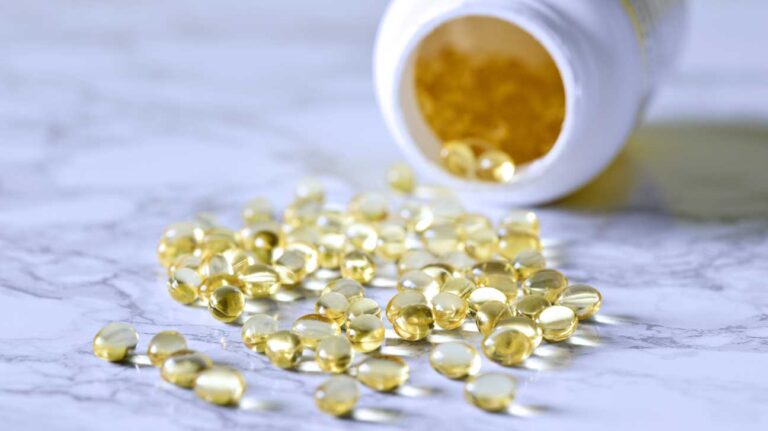Yes, you can take cod liver oil and omega-3 supplements together. They both provide omega-3 fatty acids. However, be cautious not to take too much cod liver oil, as it contains high levels of vitamin A, which can be harmful in excess. It’s always a good idea to check with a healthcare professional to make sure it’s safe for your specific needs.
In this section, you will find information on the benefits of both of them along with recommended dosage guidelines.”
Understanding Cod liver

Cod liver oil is a nutritional supplement that is derived from the liver of codfish. It is a rich source of essential nutrients, including omega-3 fatty acids, vitamin A, and vitamin D.
Here are some key components of cod liver oil:
Omega-3 Fatty Acids: Cod liver oil is a particularly good source of omega-3 fatty acids, including EPA (eicosapentaenoic acid) and DHA (docosahexaenoic acid). These fatty acids are known for their various health benefits, such as supporting cardiovascular health, reducing inflammation, and promoting brain function.
Vitamin A: It is high in vitamin A, which is essential for maintaining healthy skin, vision, and immune function. However, excessive intake of vitamin A can lead to toxicity, so it’s important to use it in moderation.
Vitamin D: Further, also a natural source of vitamin D, which is crucial for bone health, immune system function, and overall well-being. Adequate vitamin D is important for the absorption of calcium and phosphorus in the body.
Other Nutrients: In addition to omega-3 fatty acids, vitamin A, and vitamin D, cod liver oil contains various other nutrients such as vitamin E and minor amounts of minerals like phosphorus.
In addition, consuming cod liver oil in moderation can offer several health benefits. However, it’s important to note that excessive intake of cod liver oil can lead to vitamin A or vitamin D toxicity, so it’s crucial to follow recommended dosage guidelines.
Omega-3 Supplements
Omega-3 supplements are dietary supplements that provide a concentrated source of omega-3 fatty acids. They are a type of polyunsaturated fat that is essential for various bodily functions and is known to offer several health benefits.
The three main types of omega-3 fatty acids are:
Eicosapentaenoic Acid (EPA): EPA is known for its anti-inflammatory properties and is associated with cardiovascular health. It is commonly found in fatty fish such as salmon, mackerel, and sardines.
Docosahexaenoic Acid (DHA): DHA is a crucial component of cell membranes, particularly in the brain and eyes. It is abundant in fatty fish and is important for cognitive function and visual health.
Alpha-Linolenic Acid (ALA): ALA is another one, primarily found in plant sources such as flaxseed, chia seeds, and walnuts. The body can convert a small amount of ALA into EPA and DHA, although the conversion rate is relatively low.
Omega-3 Supplement Comparison
| Omega-3 Supplement | Source | Main Omega-3 Fatty Acids | Form | Main Benefits |
| Fish Oil | Fatty fish (e.g., salmon) | EPA, DHA | Liquid, Capsules | Cardiovascular support, anti-inflammatory benefits |
| Krill Oil | Krill (tiny crustaceans) | EPA, DHA | Capsules | Marketed for superior absorption, similar benefits as fish oil |
| Algal Oil | Algae | DHA | Capsules | Vegetarian/vegan source, supports cognitive function, eye health |
| Flaxseed Oil | Flaxseeds | ALA | Liquid, Capsules | Vegetarian/vegan source, supports heart health, anti-inflammatory benefits |
How Much Omega-3 Do You Need?
| Population Group | Recommended Daily Omega-3 Intake |
| Children (5 to 14 years) | 500mg daily |
| Adults under 40 (assuming good health) | Around 1000mg daily |
| Adults over 40 or at higher risk of heart disease or arthritis | 2000mg daily |
Moreover, it’s important to note that these are general recommendations, and individual needs may vary based on factors such as overall health, specific health conditions, and dietary habits. If you have concerns about your omega-3 intake or are considering supplements, it’s advisable to consult with a healthcare professional for personalized advice.
Additionally, obtaining omega-3 from a variety of food sources, including fish, flaxseeds, chia seeds, and walnuts, is recommended for a well-rounded approach to nutrition.
How Much Cod Liver Oil Do You Need?
| Population Group | Dosage |
| Adults (General Health Maintenance) | 1 to 2 teaspoons (5-10 ml) per day |
| Adults (Specific Health Conditions or Deficiencies) | Higher doses as advised by a healthcare provider |
| Children | Dosage based on age, weight, and health status. Use pediatric formulations or follow health care provider’s advice. |
Benefits of Cod Liver Oil
- Rich in EPA, DHA, vitamins A, and D
- Powerful anti-inflammatory properties
- Lowers inflammation, reducing pain and anxiety
- Promotes healthy fetal brain function and eyesight
- Maintains bone density
- Lowers risks of type 1 diabetes in pregnancy and newborns
- Supports a healthy immune system
- Prevents upper respiratory illnesses
- Lowers triglycerides in blood
- Lowers blood pressure
- Slightly increases HDL (the “good cholesterol”)
- Prevents plaque build-up in arteries
- Used historically to prevent rickets, but concerns about potential vitamin toxicity in children
Additional Benefits of Omega-3

- Lowers cholesterol and triglyceride levels, promoting heart health, and reducing high blood pressure.
- Provides anti-inflammatory benefits, supporting joint health and alleviating pain, particularly in arthritis.
- Supports healthy blood circulation, diminishes plaque build-up, and decreases the risk of strokes.
- Improves nerve cell communication, commonly known as ‘brain food.’
- Elevated levels of EPA and DHA may alleviate feelings of anxiety and irritability.
- Essential for hormone production, offering relief from menstrual cramps or menopausal symptoms.
- Anti-inflammatory properties may prevent or alleviate skin conditions like rosacea, psoriasis, and eczema.
| Potential Risks | Considerations for Cod Liver Oil | Considerations for Omega-3 Supplements |
| Pregnancy Concerns | Experts advise caution due to high vitamin A levels, potentially harmful to the unborn baby. Always consult with a healthcare provider during pregnancy. | Omega-3 supplements may be a safer option during pregnancy, but consultation with a healthcare provider is recommended. |
| Medication Interference | Avoid if taking blood thinners like Warfarin, as it could enhance blood-thinning effects. Consult with a healthcare provider. | May have blood-thinning effects, potentially interacting with medications. Consult with a healthcare provider, especially if taking blood-thinning medications. |
| Toxicity (Vitamins A and D) | Both vitamins A and D can be toxic in high doses. Be mindful not to exceed recommended amounts. | Some supplements, especially fish liver oil-based, may contain significant amounts of vitamins A and D. Avoid excessive intake to prevent toxicity. |
| Digestive Issues | Individual tolerance may vary. Be aware of potential digestive discomfort. | Some individuals may experience digestive issues, such as bloating or diarrhea. Start with lower doses and gradually increase intake. |
| Interactions with Medications | Consult with a healthcare provider, especially if taking medications. | Omega-3 supplements may interact with certain medications. Consult with a healthcare provider if taking medications like blood pressure medications or anticoagulants. |
| Quality of Supplements | Choose high-quality products to avoid contaminants. | Ensure high-quality supplements to avoid potential contaminants. |
| Allergic Reactions | Individuals with fish allergies should exercise caution. Consider plant-based alternatives like algal oil. | Fish oil-based supplements may pose a risk for individuals with fish allergies. Consider plant-based alternatives for omega-3 intake. |
FAQ’s
Q: What supplements should not be taken with cod liver oil?
A: Cod liver oil might interact with supplements that slow blood clotting, such as garlic, ginger, ginkgo, nattokinase, and Panax ginseng. Always consult with a healthcare professional.
Q: What should you not mix Omega-3 with?
A: Omega-3 supplements may interact with anticoagulant drugs, blood pressure medications, contraceptive drugs, orlistat, and vitamin E. Consult your healthcare provider before combining.
Q: What not to mix with cod liver oil?
A: Avoid combining cod liver oil with anticoagulants (warfarin), aspirin, dipyridamole, ginkgo biloba, or ginseng, as it may increase the risk of bleeding. Seek medical advice.
Q: Is there enough Omega-3 in cod liver oil?
A:Yes, Cod liver oil is rich in omega-3 fatty acids, offering benefits like reduced inflammation and lower cholesterol, along with essential vitamins A and D.
Q: Is it OK to take cod liver oil every day?
A: Yes, While there are no set guidelines, a common safe dose is 1–2 tsp daily, providing omega-3 fatty acids, vitamin A, and vitamin D. Consult your healthcare provider for personalized advice.
Q: What happens if you take cod liver oil every day?
A: Regular consumption of cod liver oil may lead to fewer depressive symptoms and reduced anxiety, supported by studies. Consult your healthcare provider for proper guidance.
Q: When should I avoid omega-3?
A: If you are on medications, especially blood thinners, or have chronic health conditions like diabetes or heart disease, consult your doctor before taking omega-3 supplements.
Q: How much cod liver oil per day?
A: The recommended dose is one teaspoon (5 ml) daily, providing vitamin D3, vitamin A, vitamin E, and omega-3 fatty acids EPA and DHA. Follow product guidelines.
Q: How many cod liver oil capsules per day?
A: Dosage varies by age. For adults and children aged ≥14 years, 2 capsules, 2 times per day. Children under 6 years should not take capsules.
Q: Can cod liver oil affect your kidneys?
A: Yes,Cod liver oil may reduce protein in the urine, a marker for kidney disease severity. If you have kidney issues, consult your healthcare provider.
Q: Does cod liver oil lighten skin?
A:Yes, Cod liver oil in liquid form may help with hyperpigmentation, including acne scarring. Consult a dermatologist for personalized advice.
Q: Can taking cod liver oil be harmful?
A:No, When taken within recommended amounts, cod liver oil is likely safe. High doses may interfere with blood clotting, increasing the risk of bleeding.
Q: What’s the difference between cod liver oil tablets and omega-3?
A: Both contain beneficial omega-3 fatty acids, but cod liver oil tablets also provide vitamins A and D. Omega-3 supplements may be a preferable option for specific needs.
Q: Does cod liver oil help hair growth?
A: Yes,Some studies suggest that omega-3 in cod liver oil may stimulate hair follicles, potentially aiding hair growth. Individual responses vary.
Final Words
Taking cod liver oil and omega-3 supplements together is generally feasible, as both are rich sources of omega-3 fatty acids. However, it’s crucial to be mindful of the overall dosage, especially considering the vitamin A content in cod liver oil.
Furthermore, excessive vitamin A intake can lead to adverse effects. Before combining these supplements, it is recommended to consult with a healthcare professional to ensure a safe and suitable approach based on individual health needs. Always prioritize moderation and personalized guidance for optimal well-being.

